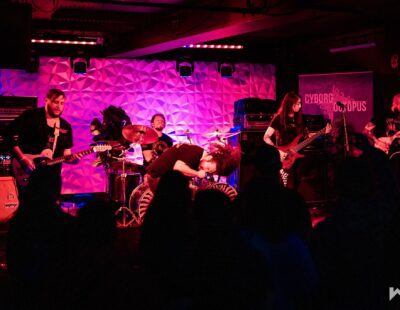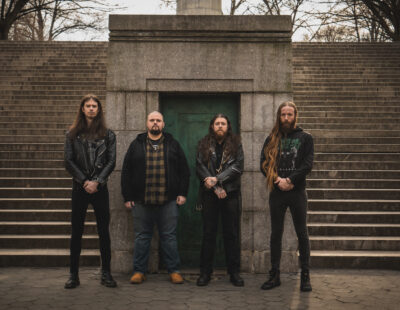Currently tearing across the States with fellow thrash vets Anthrax and Death Angel, Testament will be releasing their tenth album in spring. Entitled The Dark Roots of Earth, Testament frontman Chuck Billy has intimated that it’ll go atomic in the pit much in the same fashion as 2008’s The Formation of Damnation did. Hmm… Good news for the consensus that argued that the Oakland quintet had never sounded better. Yeah it’s a long time coming and all those thrashers who got their necks bent of of shape with Formation… will be pissed off at the wait, but they can at least console themselves that Testament are operating a strict business-as-usual policy when it comes to the music
Despite losing drummer Paul Bostaph (initially to injury, but as Chuck explains Bostaph has left the band permanently), they’ve got a more than worthy replacement, especially for fans of the band’s Demonic era… Albeit on a wait-and-see temporary basis.
Testament are playing it close to their chest at the moment but we got Chuck to give us a few ideas on what to expect from the new record.
How’s the tour going?
Really good, it’s this second leg of the Anthrax/Death Angel tour and we’ve picked up right where we left off, just got back into it. The shows are going really well. It’s been a really good package—it’s co-billing but Anthrax closes the show.
And Gene Hoglan is drumming with you at the moment, right?
Yeah, he’s drumming for us and Anthrax. Charlie’s mom is ill, and he needs to be home near his mom right now.
Is there any resolution to the drummer situation with Testament; have you got an idea of who will be there permanently?
Well Paul [Bostaph] has recovered but he is not coming back to the group. He has decided to start a new band, I guess. So, we had Gene do the record, and Gene’s gonna do the touring for the record.
Do you think Gene would come back full-time? It’d be a popular one for the fans.
Well we’d love it if he decided to but we haven’t really got that far yet. We just have to get through this tour and see where we’re at. Gene kills it.
The Formation of Damnation came out ages ago, it went really well—why so long in following it up?
Well things just kept popping up. We had that Megadeth/Exodus tour pop up, then we had the Slayer/Megadeth tour… All these tours kept on popping up while we were trying to get the record written and recorded so, yeah, it took a little while but after we finished the Anthrax tour in—what was it?—October we just buckled down and got it done.
What do you put the success of Formation down to? It’s like Testament had a genuine renaissance and the band never seemed to be more stable?
The way we’re feeling about it, we as a band got an opportunity to finish something that we all started together, in a sense. I mean, not like we’re finished now, but we were back together and it feels good to play some of the old songs that we haven’t played in a long time, ‘cos some band members [in the past] didn’t want to do them or whatever, but having the original guys we can play anything from our catalog and it feels pretty good to do it. It’s like a second chance, just… Well, to finish something.
A band with a legacy (no pun intended), is always going to have that pressure creatively.
Yeah, I think so. In the writing process we don’t really think about it, we know what we want and need to do, but the songs just seem to come out. We’ve been writing and playing together for long enough that the songs just come together pretty quick.
What is the writing process like? Is Eric handling most of the music or is it a group effort?
Sometimes, it’s both—the majority of it Eric came up with because he’s been our main songwriter, and then Alex will come in and make some suggestions as far as arrangements go, and it seems to work out really well that way because Alex has good suggestions.
Alex has said that his other projects have given him fresh ideas when it comes to doing things with Testament, and to have him involved in the writing process must be a great asset.
He’s such a great player. He’s such a great addition to the sound of Testament; he is part of the sound and it’s very important to have him here in the mix [creatively].
How far along is The Dark Roots of Earth?
Well we just finished all of the recording the day before we left before this tour. We turned everything in and they’ve started mixing it now. Right now it’s just the beginning of the mix process.
Andy Sneap is producing it; did you go to England to track it?
We did it at our place in Oakland and at Trident Studios and Andy came out and did all the recordings with us—as much as he could—and then we finished off some vocals and guitars at Trident studios. I think over the years Andy really knows the sound of this band, and kinda knows what we want. We’ve mixed stuff with Andy, so I think he knows without has having to be there physically with him what we are looking for. And I just haven’t heard anybody in metal come out with any better mixes! Honesty!
Are you playing any new song on this tour?
No, we’re not. The Internet kinda spoiled that; we’d rather wait until it’s heard and judged as the real deal and not y’know somebody’s cellphone!
Shame, no iPhone and YouTube clips!
Yeah! I’ve seen it happen to other bands and you’ll get someone saying, “Oh, that doesn’t sound so good” but someone’s just listening to a telephone recording of a live performance.
It’s difficult to keep anything a surprise these days.
It would be good to start playing the stuff but we’ll just wait ‘til it’s out. Plus, if you don’t know a song, people don’t know how to react to it, and until they have the record and they’re familiar with the songs that’s for us to perform it. Performing music in front of people who don’t know it—it almost works against you, like, “How come they don’t get it? How come they’re not banging?” Well they’re just absorbing it, and it takes time, and it makes it weird for the band as well as the fans.
https://youtu.be/9Zmt_eDkQLg
What can you tell us about some of the songs on the album?
Well, there’s a song called “Native Blood”, which is basically a song about my Native heritage. It’s almost like a protest song, that the Native Americans have a voice that needs to be heard—that’s the chorus of the song. There’s another called “True American Hate”, which was kinds inspired by when we sent all our troops overseas there, and we were just seeing in the news when all that was going on a lot of young kids, under 10 years old, out there with their families burning American flags. And that was a pretty shocking thing to see, to see that generation, a kid that young being taught to hate that much. It makes you think what’s going to happen, 10 to 15 years from now when the majority of these kids have just been raised to hate? It struck me as a little odd. There’s a song called “Cold Embrace”, which we kinda hoped we’d be able to pitch the song into one of the Twilight series movies; it’s a song about a girl becoming a vampire and never being able to see the sun again. “The Dark Roots of Earth” is kind of a play on the band we have together, just like a metaphor, like Testament is a tree and all of us in this group are really embedded in the planet, in the earth, the environment and our surroundings. It was kind of a play on that.”Rise Up for War” is more of a war song, like your preparing yourself for war, going into battle. There is a lot of cool stuff there.
Testament have had environmental themes before—is this going to be a political album in some respects?
No, I don’t think so. We’ve never been a political band, we just like to write things that are real, that we have to deal with and everybody has to deal with, things that are part of everybody’s life so that people can relate to it. I think everybody has to relate to what’s going on in our world as far as the environment goes.
“Native Blood” must be a very personal song for you. What message are you sending out with “Native Blood”, what sort of issues need addressing for the Native American community?
It is much different now compared to 10, 15 years ago, like on our reservation it was a pretty bad place 15 years ago. There was no help from the government, the schools were run down, no transportation, the housing was bad, broken down cars piled everywhere…. It was bad until we put a casino on our reservation and the money generated put people in work, brought back the schools, the culture, the language and the transportation to get the kids to school. But it’s just a bit of a sad thing that once you start helping yourself, the next thing you know the government’s got their hand out wanting their share for something you’ve done yourself and helping your own. It’s a sad thing; you ask for help and you don’t get it, as soon as there’s money involved the hands are out wanting a part of it. To me it was just about having a voice, for the Native Americans to have a voice that could be heard.
Is that one of the challenges facing Native American communities—raising awareness of their culture, language, and re-establishing that identity and community.
Definitely, the culture, the language, the history… I mean, if our reservation didn’t have a casino we might have lost all our language and culture, education would have been very bad if we didn’t get the help.
It’s very important, then, to spread the message to the younger generation of Native Americans, and keep them in touch with their culture.
Absolutely. That’s what it’s all about. Over the last year I’ve got some cool recognition for being Native American. I was put into the Smithsonian Institute in Washington DC , on a display called “Up Where We Belong”, which was for Native Americans in pop culture and I was representing the heavy metal sector, and a couple of weeks ago I was the first Native American inducted into the Hard Rock Casino and Hotely in Albuquerque, New Mexico. That was a pretty big thing. It’s kinda cool to get there. There are so many reservations. I did an interview on a tribal radio station which broadcast all the way into Alaska, the US, Canada…. I think I hit a million people that day; there are a lot of Natives out there getting the word across about metal and what we stand for. I did the very first Native American Music Awards in 1990 or something like that and at the time there were no heavy metal bands in the categories; there were just Native artists, but a lot of these Natives were multi-platinum acts but they sold their records just touring and selling across the reservations. There’s a big Native American audience to support their people.






